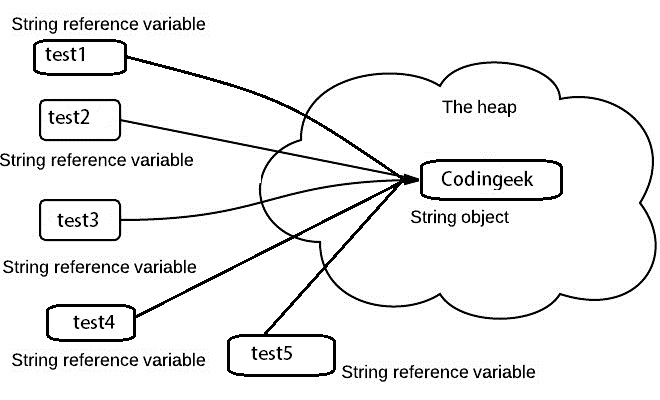Why Are Strings Immutable in Java? In-depth Evaluation for Designers
Wiki Article
Immutable Strings: A Secret Component in Ensuring Data Uniformity and Reliability
In the world of data administration, the importance of unalterable strings can not be overemphasized. These changeless sequences of characters play an essential role in supporting the honesty and accuracy of info within systems. By preserving a state of immutability, data consistency is made certain, fostering a foundation of integrity whereupon critical processes depend. The concept of unalterable strings transcends mere technicality; it is a linchpin in the complicated web of information governance. As we check out the benefits, application approaches, and useful applications of immutable strings, a clearer picture emerges of their vital nature in guarding the digital landscape.The Concept of Immutable Strings
Immutable strings, a basic principle in programming, describe strings that can not be customized when they are created. Basically, as soon as a string worth is assigned, any procedure that shows up to change the string in fact produces a brand-new string. This immutability ensures information consistency and dependability in applications, as it stops unexpected changes to the original data.
Advantages in Information Consistency

Information uniformity is critical in different elements of software program growth, consisting of data source administration, multi-threaded environments, and dispersed systems (Why are strings immutable in Java?). Immutable strings add substantially to accomplishing this consistency by preventing data corruption as a result of simultaneous gain access to. In scenarios where multiple procedures or strings engage with the same information at the same time, unalterable strings function as a secure against race problems and synchronization issues
Furthermore, the immutability of strings simplifies debugging and screening processes. With unalterable strings, programmers can rely on that once a string is established, it will remain unmodified, making it easier to map the resource of mistakes and making sure that test situations produce constant outcomes. This reliability in information handling inevitably leads to much more robust and steady applications.

Implementing Immutable Strings
Making certain the immutability of strings calls for a thoughtful method to their implementation in software application development. One key approach is to develop string courses in a manner that stops modifications as soon as a string item is developed. By making strings immutable, programmers can enhance information consistency and integrity in their applications.To execute immutable strings properly, developers ought to favor developing new string things instead of customizing existing ones. This practice makes sure that once a string is More Info designated a worth, it can not be changed. Furthermore, any type of operation that shows up to modify the string ought to develop a new string with the preferred changes rather than changing the initial.
Additionally, utilizing immutable strings can simplify concurrency administration in multi-threaded environments. Given that immutable strings can not be changed after development, they can be securely shared amongst multiple threads without the danger of data corruption.
Duty in Reliability Guarantee
In software program advancement, the utilization of immutable strings plays an essential function in making sure the dependability of information operations. Unalterable strings, once created, can not be changed, making certain that the information they stand for continues to be consistent throughout the application's execution. This immutability residential or commercial property supplies a degree of guarantee that the information being refined will certainly not be inadvertently altered, causing unexpected outcomes or errors in the system.try this website By incorporating immutable strings right into software program design, developers can improve the reliability of their applications by reducing the risks connected with mutable information - Why are strings immutable in Java?. Immutable strings aid in preventing data corruption or unexpected adjustments, which can be particularly vital when taking care of sensitive info or when data integrity is vital
Furthermore, the use of unalterable strings streamlines simultaneous handling, as several threads can securely accessibility and share string information without the danger of one thread altering the content while another reads it. This element adds substantially to the general reliability of the software system, ensuring regular and foreseeable actions in data handling procedures.
Applications and System Combination
The seamless combination of immutable strings right into different applications and systems is pivotal for guaranteeing durable data consistency and dependability across varied technological atmospheres - Why are strings immutable in Java?. Immutable strings play an essential duty in improving the integrity of data exchanges and communications within complex software application communities. By integrating unalterable strings right into applications, designers can minimize the dangers linked with information tampering, unauthorized alterations, and unintended alterations, thereby strengthening the total protection posture of the systemIn the context of system integration, unalterable strings act as a fundamental component for developing secure interaction networks and assisting in seamless data transfers between various parts. Their immutable nature guarantees go to this site that information transmitted in between systems continues to be verifiable and unmodified, minimizing the possibility of variances or errors that might endanger the integrity of the whole system. Moreover, unalterable strings can boost interoperability in between disparate systems by supplying a standard layout for data representation, making it possible for more efficient information handling and exchange methods throughout interconnected systems. By embracing unalterable strings in applications and system assimilation processes, organizations can strengthen their information infrastructure and promote the dependability and uniformity of their information properties.
Final Thought
Finally, immutable strings play an important function in maintaining information consistency and reliability in numerous applications and system assimilations. By making sure that strings can not be altered once produced, the integrity of information is protected, decreasing the danger of incongruities and mistakes. Applying immutable strings can significantly boost the dependability of systems, eventually resulting in even more exact and trustworthy data handling.
Report this wiki page